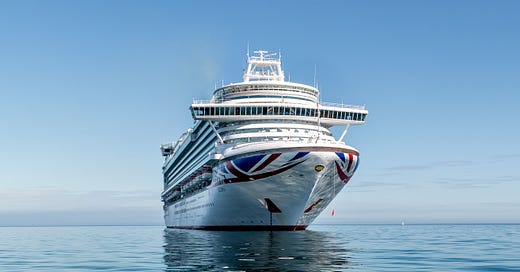That travel, domestic and international, is fun, mind-expanding, freedom-enhancing and generally good, seems at the heart of the American, post-World War II, Middlebrow mindset. The popularization of car culture and later democratization of air travel put the whole country within reach of a lot of people, fueling a kind of individual manifest destiny.
Of course, “fueling” has been a problem and all sorts of environmental and cultural externalities have resulted and though airlines promise us that they are offsetting the carbon footprints of our flights and hotels assure us that if we just don’t ask for fresh towels every day, that we can mitigate our impacts, a pretty significant portion of intelligent people now question whether tourism is good.
These criticisms will grow louder and more poignant as virtual and enhanced reality experiences improve. Sure, back in the late 20th century we imagined that a starship that could take you anywhere would also include a holodeck that could take you anywhere else. There’s a good argument to be made that most people don’t need access to both.
This all comes up for The Middlebrow because of a comic essay in Harper’s about an author attending a “Goop” cruise, where people willingly trap themselves on a boat with Gwyneth Paltrow’s lifestyle brand. Essayist Lauren Oyler references David Foster Wallace’s essay “A Supposedly Fun Thing I’ll Never Do Again,” which was Wallace’s own send-up (and takedown) of the Caribbean cruise experience. This led to a discussion on a David Foster Wallace listserv (yes, it still exists!) and further talk about cruises being just the worst for the Earth in terms of travel, without much defense mounted for driving, flying around or staying in hotels.

One member quoted Wallace, from a footnote to his essays in Consider The Lobster:
“To be a mass tourist, for me, is to become a pure late-date American: alien, ignorant, greedy for something you cannot ever have, disappointed in a way you can never admit. It is to spoil, by way of sheer ontology, the very unspoiledness you are there to experience, It is to impose yourself on places that in all non-economic ways would be better, realer, without you. It is, in lines and gridlock and transaction after transaction, to confront a dimension of yourself that is as inescapable as it is painful: As a tourist, you become economically significant but existentially loathsome, an insect on a dead thing.”
Here, we dispense with the environmental arguments and go right for the values jugular. What good is tourism? You can visit Paris but never the Paris of your dreams. In Woody Allen’s Midnight In Paris, the hero makes a contemporary visit to the city but spends his time in a fantasy of Paris in the 1920s, only to meet a woman who prefers the fantasy of the belle époque. But absent movie magic, the only Paris available to anyone right now is the Paris of right now, with its protests of Macron, unsettled social issues of French colonialism and a history that is preserved, but still a memory. Having a drink at the Algonquin in New York City does not, in fact, get you into Dorothy Parker’s vicious circle or do anything to restore the sensibility of Wallace Shawn’s New Yorker to the public consciousness.
On the other hand, maybe Wallace is being too cynical or too precise. Do we travel to see things that are unspoiled? Unspoiled by what? By ourselves? Or do we travel to interact with new places and new people and to see how that affects us? Why is that an act of spoiling? It may well be an act of contribution.
Migration and immigration are at the heart of the Middlebrow mindset, after all. The idea is that you can always go someplace new and learn new things about that place and yourself. There is nothing unspoiled about nativism and while the critics of travel are not, as far as I can tell, arguing for provincialism, they are implying that there’s something inauthentic and even harmful about tourism.
A lot of people (too many) don’t get to travel to all of the places they want to experience. Economic resources are a problem and time is even more an obstacle. It’s a sad reality that as we grow up and more economically secure that pressures of work and children’s school can limit travel opportunities while demands from family can disrupt plans. Since I mentioned the French protests against Macron earlier, I’ve seen plenty of Americans shrug, “What’s the big deal about raising the retirement age from 62 to 64?” Mortality is the big deal, as is health. Retirement gives that time back for travel but not 100% of the time between the cessation of regular work and the snipping of the mortal coil because to travel you have to be healthy and physically able and so the early years of retirement are the most crucial and the cruelest to have snatched away.
So every trip taken for pleasure, or out of curiosity, is a gift and The Middlebrow doubts you’re spoiling anybody else’s time (just, behave like a guest) and you probably are making your own mind better and bigger.
Come on, everybody. Travel is good.


Great piece.
I picture a young Kerouac or a middle-aged Steinbeck attempting to publish "On The Road," or "Travels With Charlie," today only to be rejected with a stern admonishment for the economic, environmental and probably cultural impact their trips had cost.
Trips are more than trips, if done right. They are intellectual fodder. In some cases, life-changing moments. At the very least (though still important) they are rejuvenating.
The people not staying home and ignoring this attitude are the ones America so desperately wants to emulate: Europeans. Swedes get around six weeks of vacation time a year. They aren't sitting at home staring at the walls for a month and a half, I can tell you that much.